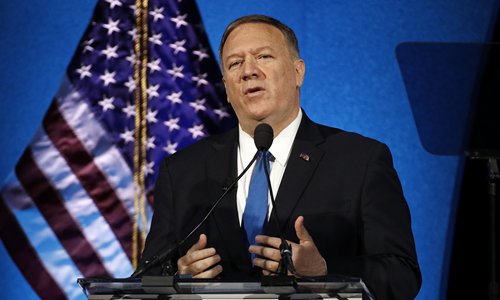Pompeo on wrong side of history

Photo: IC
Three decades after the fall of Berlin Wall, mind-set of some US politicians is still stuck in Cold War era. Secretary of State Mike Pompeo is a typical example.
In a speech near Berlin's iconic Brandenburg Gate on Friday, US Secretary of State Mike Pompeo aimed at China by saying the Communist Party of China (CPC) is "shaping a new vision of authoritarianism." He accused the CPC of suppressing Chinese people and harassing the families of Chinese Muslims in Northwest China's Xinjiang Uyghur Autonomous Region.
Such malicious remarks are a continuation of his series of attacks against China recently. In late October, he said the CPC wants "international domination" and has embarked on a "global campaign" to sway countries to its side.
That a US diplomat as senior as the secretary of state ramping up efforts to criticize China, with which the US has the most important relationship, is shocking. Pompeo's groundless accusations against China and attacks on China's political system, which aim to alienate the CPC with the Chinese government and the Chinese people, show his ignorance of China's modern history.
Pompeo is ignorant of the core position of the CPC when it led the Chinese people to develop this big country and the remarkable achievements of the CPC. If he spares some time conducting some research, he would find that the Chinese people are highly supportive of the CPC leadership.
Obviously, Pompeo is trying to smear China with the old-fashioned ideological tools so that the US could gain an upper hand in its strategic competition with China.
When ideology dominates China-US relations, it is highly possible that the two countries will head toward a new cold war, including overall confrontation, and irreconcilable conflicts. At the current stage, Pompeo is pushing the bilateral relations to a dangerous path which will initially jeopardize the ongoing trade talks.
Ideological differences have existed between Beijing and Washington in the past 40 years. But they were set aside because the two countries believed cooperation outweighs confrontation that can open brighter prospects for the two countries. However, this consensus has been crushed by some politicians in the current US administration.
The difference in ideologies does not necessarily lead to conflicts. There are various political entities and diverse ideologies that can coexist in the world and these differences do not hinder countries to develop ties. But if the US tries to impose values and ideologies on China, it will be bound to face backlash, besides the US is in no position to tell China which path it should take.
China's diplomatic initiative is gaining momentum and China tries to keep its relations with the US as steady and rational. Therefore, China will not steer the wheel of bilateral relations to a dead end.
In today's world, that countries with different ideologies and political systems can respect each other and peacefully coexist to fit their national interests. This also requires them to find a mode for such peaceful coexistence.
When the international order is undergoing profound changes, some countries, with the US as a typical example, are trying to change the existing order. From the "America First" policy advocated by current US administration, we can see that the US is prioritizing its national interests when it comes to diplomacy instead of taking the interests of other countries into consideration. Such an act has sent shockwaves across the world. China, on the contrary, has remained firm to provide public goods for global governance. This is also an ideological difference between China and the US.
Washington will find fewer and fewer followers in its attack against China. Even its European allies will think twice before following the US blindly. In Pompeo's latest attack on China, Germany has shown a reserved attitude. The international community will realize that the US, represented by politicians like Pompeo, is on the wrong side of history.
The author is an assistant research fellow at the China Institute of International Studies. opinion@globaltimes.com.cn